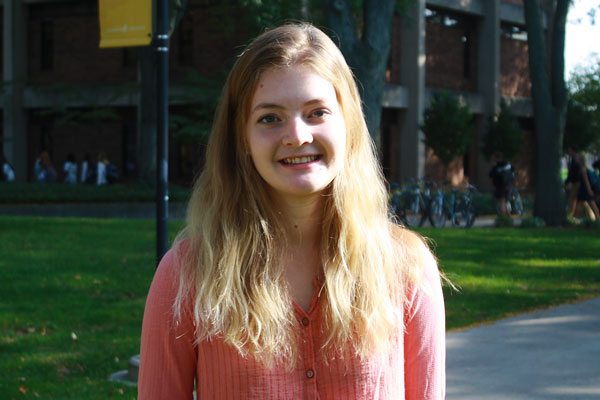When I was asked to respond to David Jantz’s article from last week, my immediate response was internal panic. I am already full of questions about religion and understanding my own beliefs, let alone conveying thoughts in such a public forum.
I am also uneasy with contradiction and do not want my perspective to be in opposition to David’s; in fact, I agree with much of his article and have wrestled with many of the same ideas, although with different results.However, making belief a conversation is vital to our growth as individuals and communities.
As a campus, I would love to see more transparent conversations about faith and increased acceptance of uncertainty and questions. We need to respect the dignity and experiences of others and hold our own beliefs lightly.
Like David, I grew up in a Mennonite family and congregation, essentially swallowing the faith tenets I was given without processing deeply until college, where the questions hit full-force. And if David’s and my stories (and those of countless others) are any indication, college can scramble your beliefs and leave you with faith whiplash.
Finding language to discuss spiritual matters is something I struggle with – vocabulary generally seems inadequate for communicating such complex topics. So please hear my words, and those of others, with grace.
Take “Christianity,” for example. Similar to David, this word often gives me shivers. “Christian” has a wide range of implications across the world, and I would rather not be associated with many of the connotations – violence, intolerance, injustice, superiority, exclusivity. Sadly, the list of wrongs committed in the name of religion is too extensive for this space.
Additionally, I have increasingly found that while Jesus offers an incredible model for how to live a life of meaning, his divinity or lack thereof feels rather irrelevant at this point in my life. This sense of discomfort at a savior Jesus is due in part to a deep respect for the Muslim faith of loving host families in both Senegal and Morocco, leading me to the conclusion that any spirituality I want to be a part of is a set of values and way of being, rather than particular doctrinal statements or labels.
Without the comfort of being able to place myself in a neat box labelled “Christian,” I am left to continue questioning and wondering where my journey toward deeper understanding leads. Through all the confusion, however, I have remained convinced of the presence of a higher force in the cosmos, something beyond my comprehension. After all, my lifetime of schooling has taught me just how little I know.
Despite my biochemistry major, I refuse to believe that everything in our universe can be entirely explained or proven in rational, logical, human terms–that would leave little room for the story, mystery and emotion that my experiences have shown me are another facet of truth. I also stand in awe of the “majesty and mystery of the universe” that David referenced; for me, this is “God.”
The goosebumps at powerful music, the peace of walking in the woods, the comfort of laughing with friends, the tears of outrage at injustice, the excitement of learning–all of this and more is encompassed in my understanding of God.
God: an undefinable justice-filled love, an inexplicable presence I sense when I am most in tune with the world around me.
And so I have committed to remaining connected with the spiritual aspect of life, though this pledge has been tested repeatedly. This commitment has meant consciously participating in church as part of a community that encourages me to keep questioning and growing.
While some searching may feel very individual, I have found it worthwhile to seek out communities with shared values, such as nondiscriminatory love and resistance to injustice. Staying in conversation with people and communities that challenge me to be my best while loving me for who I am continues to surprise me a with deeper understanding of a universe that is both bigger and smaller than I can ever dream of comprehending.
My musings on Christianity and spirituality may cause you to nod your head in agreement or shake it in frustration. Either way, join in conversation, with respect and openness.
Please don’t hide questions or see them as problems, and don’t remain quiet out of fear of being misunderstood. Listen to others with respect, attempting to withhold judgment; treat others with dignity, even if you disagree with them.
Like David, I would love to hear responses so that each of us can continue questioning and growing. Again, I encourage you to be open to questions, conversations and new perspectives.



